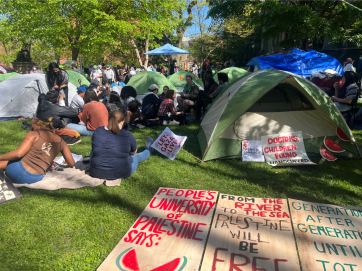The National Association of Scholars (NAS) released its first case study, Neo-Segregation at Yale University on April 29 at the Kirby Center in Washington, D.C. More than 40 academics, members, donors, and interested persons attended the event. The evening began with a reception of beer, wine, and hors d’oeuvres then moved to the main presentation by NAS president Peter W. Wood. Dr. Wood and Dion Pierre explained their approach to the extensive and ongoing project, “Separate but Equal, Again: Neo-Segregation in American Higher Education.”
Dr. Wood first discovered segregated graduation ceremonies at Harvard in 2016. He believed this instance and any like it to be a recent and rare occurrence. As Mr. Pierre began to research the topic, he and Dr. Wood quickly found that these programs were widespread and that this sort of voluntary segregation—what they termed “neo-segregation”—existed on most American campuses. Only one college of the 173 surveyed had no segregated programs.
In the Yale report, primary author Mr. Pierre, went to Yale Daily News achieves of the 1960’s to seek out the origin of neo-segregation at the school. He quickly discovered that Yale’s early good-faith effort to integrate the school by lowering admissions standards and accepting more black students lead to the first demands for segregated student arrangements.
Neo-segregation continued onto other campuses as university administrations tried to find a cure for high dropout rates and low matriculation of minority students.
Today, of the 173 schools surveyed, 72% segregated graduation ceremonies, 46% percent segregate student orientation programs, and 43% segregate residential arrangements. These programs are ostensibly voluntary, but as Dr. Wood notes, “The social pressure to conform is overwhelming.”
NAS hopes that by publishing this report that It will help inform the public about race relations in the United States. NAS desires to illuminate the dangers of segregation in a multiethnic society that depends on cooperation and community for the benefit of the common good. Segregation, NAS believes, “puts people in a racial box,” limits opportunities for cooperation, and deepens racial animosity.
Read the Wall Street Journal article -->
And for those of you who were unable to attend the event or would like to review it, an embed of the event’s Livestream:













